Making Sense of Saïd Chengriha’s Invitation to Mohamed Ould Bamba

Background
On January 5th, Mauritania’s Chief of Staff Mohamed Ould Bamba Meguett paid a two-day visit to Algeria, where he met with his counterpart, Saïd Chengriha. The latter reiterated the solidity of Algerian-Mauritanian relations, discussed the importance of materializing security mechanisms like CEMOC to cope with the rampant security challenges in the Maghreb and the Sahel. In response, General Meguett underlined Mauritania and Algeria’s friendship due to historical, social, and religious bonds.
On January 4th, Algeria sent a medical delegation and medical aid to Nouakchott to help alleviate the pressure of COVID-19 on the country’s health sector. Mauritania’s Health Minister, Nedhirou Ould Hamed, thanked Algeria’s ruling elite for the initiative and called for further cooperation and exchange to overcome the COVID-19 crisis. Clearly, bilateral relations between Nouakchott and Algiers are undergoing a remarkable transformation. In the prevalence of common threats to national and human security, cooperation is indeed the wisest approach. However, the timing of such developments raises probing questions on the rationales behind Algiers’ rapprochement initiative.
On November 13th, 2020, Morocco launched a military intervention in Guerguerat to end the Polisario-led blockade and restore commercial and civilian movement to Mauritania. Since the election of Mohamed Ould Cheikh Ghazouani in 2019, Mauritanian-Moroccan relations embarked on an era of diplomatic friendship. President Ghazouani and King Mohammed VI recognized the positive trajectory bilateral ties are taking and expressed their willingness to expand cooperation areas. On December 22nd, Morocco’s Inspector General of the Armed Forces Abdelfattah Louarak met with Mauritania’s Defense Minister Hanena Ould Sidi to discuss ways to enhance military cooperation in the presence of Bamba Ould Meguett.
On December 10th, Donald Trump signed an agreement to recognize Morocco’s sovereignty over Western Sahara, promising to open a US consulate in Dakhla. In exchange, Morocco normalized relations with Israel and agreed to reopen liaison offices in Rabat and Tel-Aviv and foster political and economic ties. Thereafter, King Mohammed VI received an Israeli delegation that included Jared Kushner and Meir Ben Shabbat, key officials in the United States and Israel. Reciprocally, a Moroccan delegation visited Israel to examine several matters, including the opening of liaison offices and air traffic.
Hence, the rapprochement between Algeria and Mauritania in light of the latest developments is of great moment. It was General Chengriha who invited his Mauritanian counterpart, and it was President Abdelmadjid Tebboune who took the initiative to send a medical delegation and aid to Nouakchott amid the COVID-19 crisis. The policy was motivated by the prevalence of a tangible security threat in the Maghreb and the Sahel, the need to counterbalance Morocco’s growing regional weight, and the need to overcome potential regional isolation.
Turmoil in the Maghreb and the Sahel
Algeria’s position in proximity to Libya and the Sahel is a valid reason for the Algerian-Mauritanian rapprochement. Since 2011, the overthrow of Qaddafi and the concomitant eruption of terrorism in the Sahel inflicted a heavy blow for Algeria’s security apparatus. Suddenly, it became engulfed with growing threats to national security from the borders with Libya, Mali, and Niger, whose length is 3,299 km. Accordingly, the defense budget (as a percentage of GDP) rose from 9.4% in 2010 to 13.7% in 2014, before reaching 15.5% in 2019.
The eight-year-long intervention of France and the implementation of regional frameworks like the G5 Sahel have proven inefficient due to operational, organizational, and strategic factors. Attacks against civilian and foreign targets have gained momentum, and the local population has increasingly become critical of France’s motives. Also, the latter has been making pivotal decisions without consulting with Algeria. In October 2020, France struck a deal with the Group to Support Islam and Muslims (GSIM). More than 200 terror detainees were freed, and a ransom was paid in exchange for the liberation of Sophie Pétronin and two other hostages. France did not consider Algeria to be a major stakeholder in this matter, especially because some detainees had participated in the 2013 attack in In Amenas. On October 27th, 2020, Algerian forces arrested Mustafa Derrar, one of the detainees, in Tlemcen.
Additionally, the Libyan scene is becoming complex due to political polarization, the quest for clout, and the lack of political credibility. As Algerian diplomat Lakhdar Brahimi said on January 8th, Libya might become a “new Somalia, a stateless country plunged into an insoluble crisis.” It is no surprise that the overall security profile of these countries has dramatically deteriorated since 2011. In the case of Libya and Mali, they moved from being 111th and 76th in 2011 to being 20th and 16th in 2020, as per the Failed States Index data.
Three Variables to Depict the Deterioration of Security Between 2011 and 2020
|
| Mali 2011 | Mali 2020 | Libya 2011 | Libya 2020 | Niger 2011 | Niger 2020 |
| Group Grievance | 6.0 | 8.4 | 6.0 | 7.8 | 7.8 | 7.8 |
| State Legitimacy | 5.5 | 7.0 | 7.3 | 9.8 | 8.9 | 7.0 |
| Refugees & IDPs | 5.3 | 8.4 | 4.6 | 8.0 | 6.6 | 8.4 |
Source: https://fragilestatesindex.org/excel/
Consequently, Algeria’s concerns are real, and the rapprochement policy with Mauritania is rational. Algeria seeks to re-impose itself as a significant stakeholder in the regional scene, which is visible at the constitutional level. On November 1st, 2020, it abandoned the non-intervention principle, in place since 1962. Henceforth, the constitution allows the deployment of armed units overseas within the respect of the principles and the objectives of the United Nations, the African Union, and the Arab League. So, Mauritania would be Algeria’s backdoor to turmoil.
Morocco’s growing regional weight
Algeria seeks to counterbalance Morocco’s growing regional weight, especially in light of the recent developments. On December 10th, Trump recognized Morocco’s sovereignty over the Western Sahara. The decision was a tipping point for Morocco-Algeria relations for three reasons. First, Washington’s new position on the Western Sahara was a milestone for Moroccan diplomacy. While this event does not bring the protracted conflict to an end, it certainly strengthens Rabat’s diplomatic position. Presidential proclamations have a distinct weight in Washington. When a proclamation aligns with the president’s authority, it can have the force of law. However, if it does not, the Congress holds the jurisdiction to reverse it. In the case of Trump, the recognition was part of his power to recognize overseas governments and launch diplomatic missions. Moreover, the US consulate opening in Dakhla would transform Trump’s initiative into a mere recognition of Morocco’s sovereignty.
Second, it is unlikely that President Joe Biden would reverse his predecessor’s initiative due to several reasons. One is the bipartisan support that Morocco enjoys on the Sahara issue. Another is the historical relations between Rabat and Washington and between Rabat and Israel. As Foreign Minister Nasser Bourita said, “relations were already normal,” so the ‘normalization’ is instead a formalization of existing relations. A third factor is the normalization facet of the coin. Biden is a fervent supporter of Israel, and it will not jeopardize Israel’s regional aspirations for the Western Sahara. A fourth factor is that the Biden Administration has to tackle pressing files like the nuclear deal with Iran and the policy towards China and Russia.
Third, several countries (African, Middle Eastern, Latin American) have opened their consulates in Laayoune and Dakhla, which tips the balance of power in favor of Morocco. The opening of some African countries’ consulates allows Rabat to hit two birds with one stone: amass support on sovereignty claims and expand its influence in Africa in accordance with King Mohammed VI’s African foreign policy. Moreover, several countries, like the United Arab Emirates, vowed their recognition of Morocco’s sovereignty and opened consulates in Laayoune. On January 10th, the Qatari channel Al-Jazeera even used a pro-Moroccan narrative in news coverage about the US delegation’s visit to Dakhla. Given the nature of Algerian-Moroccan relations, it is normal for Algeria to counterbalance Morocco’s growing regional weight by strengthening its relations with Mauritania.
Risk of regional isolation
The risk of regional isolation is another factor that accounts for Algeria’s move towards Mauritania. Amid the normalization wave in the Middle East and North Africa, other countries are likely to follow the UAE, Bahrain, Sudan, and Morocco. On January 13th, Israel’s Intelligence Minister Eli Cohen talked about a potential normalization with Saudi Arabia, Oman, Mauritania, and Niger. For him, the end of the three-year-long blockade on Qatar plays in favor of Israel when it comes to triggering a regional normalization.
In the case of Mauritania, the opposition parties submitted a legislation criminalizing normalization with Israel and equating it with accepting all of Israel’s crimes. However, that does not repeal the normalization scenario because there are realities that set the stage for such a development.
One reality is the historical relations between Mauritania and Israel. In October 1999, Muawiya Ould Sidi Ahmed Taya’s Mauritania recognized Israel and subsequently established full diplomatic ties, becoming the third Arab country to take such a move, after Egypt and Jordan. However, the Gaza war pushed Nouakchott to freeze relations. A second reality is the growing influence of the UAE in Africa. In February 2020, Abu Dhabi injected $2 billion into Nouakchott’s economy, whose one-digit GDP proves to be a weakness. While the aid aims to foster investment and development, it expands the UAE’s clout in Africa. When the latter normalized relations with Israel, Mauritania’s foreign affairs ministry greeted the move, saying it is wise and accordant with Arabs and Muslims’ interests. So, the UAE’s leverage in Mauritania and its northern neighbor is likely to trigger a normalization.
Another indicator of Algeria’s potential isolation is Washington’s appointment of John Peter Pham as the US special envoy in the Sahel. Aside from the fact that the appointment mirrors US interest in the region, it bolsters Morocco’s regional position. Admittedly, Pham is known for his pro-Morocco stances. In 2014, he warned against the risks that Algeria’s support for the Polisario poses for conflict settlement and regional security. He also supported the autonomy plan under Morocco’s sovereignty is the most realistic option to end the conflict. With regard to counterterrorism and counter-radicalization, the former US envoy for the Great Lakes region acknowledged Morocco’s role in fostering peace, labeling it a model for Africa. It is no surprise that Algeria did not welcome Pham’s appointment to strengthen Washington’s efforts for greater stability and security.
Conclusion
Chengriha’s invitation for Meguett, albeit usual for two neighbors, has coincided with a tense regional scene where the balance of power tips towards Morocco. So, an Algerian-Mauritanian military rapprochement is strategic to contain the Sahel’s imbroglio and re-impose Algeria as a major stakeholder in the sub-region. On the flip side, this strategy risks strangulating Algeria in the event of a Mauritanian-Israeli normalization. Also, it risks placing Mauritania in a difficult position towards Morocco, mainly because Nouakchott has always oscillated between neutrality and positive neutrality when it comes to Western Sahara. Finally, Algiers should avoid using the diplomatic cards of Zionism and Sahraoui independence because it risks missing tremendous opportunities.








